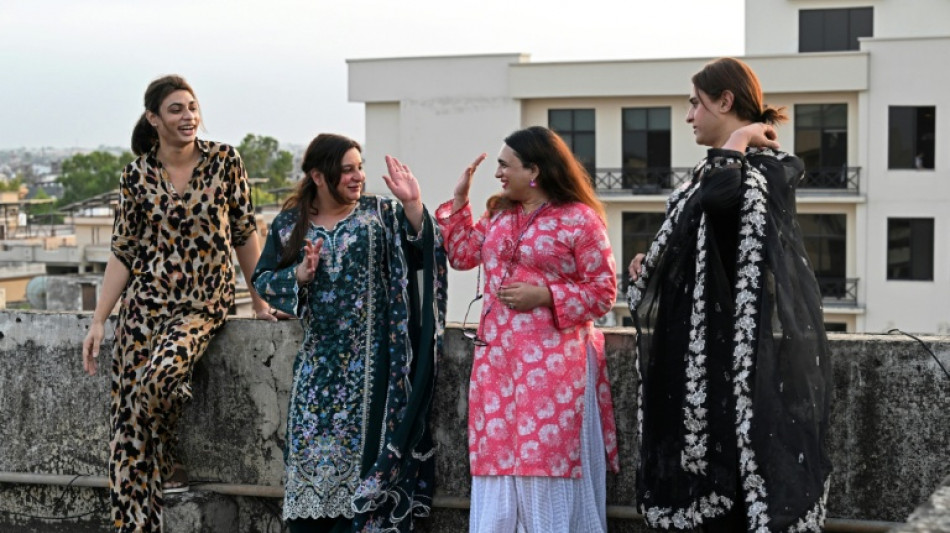
-
 Brazilian 'Superman' cheers child cancer patients in Ghana
Brazilian 'Superman' cheers child cancer patients in Ghana
-
India close in on win over South Africa after Jadeja heroics

-
 Huge explosions rock industrial area near Argentina's capital
Huge explosions rock industrial area near Argentina's capital
-
Bezzecchi takes pole for Valencia sprint and MotoGP

-
 Dominant Shiffrin leads after first slalom run in Levi
Dominant Shiffrin leads after first slalom run in Levi
-
Nine killed in accidental explosion at Indian Kashmir police station

-
 Climate protesters to rally at COP30's halfway mark
Climate protesters to rally at COP30's halfway mark
-
Fighting South Africa lose Rickelton after India 189 all out

-
 Harmer leads South Africa fightback as India 189 all out
Harmer leads South Africa fightback as India 189 all out
-
Prison looms for Brazil's Bolsonaro after court rejects his appeal

-
 EU bows to pressure on loosening AI, privacy rules
EU bows to pressure on loosening AI, privacy rules
-
India close in on lead despite South African strikes

-
 Curry's 49 points propel Warriors in 109-108 win over Spurs
Curry's 49 points propel Warriors in 109-108 win over Spurs
-
NZ boxer Parker denies taking banned substance after failed test

-
 Australia setback as Hazlewood ruled out of 1st Ashes Test
Australia setback as Hazlewood ruled out of 1st Ashes Test
-
Australia pace spearhead Josh Hazlewood ruled out of 1st Ashes Test

-
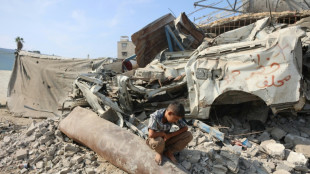 UN Security Council to vote Monday on Trump Gaza plan
UN Security Council to vote Monday on Trump Gaza plan
-
Japan's Tomono leads after men's short program at Skate America

-
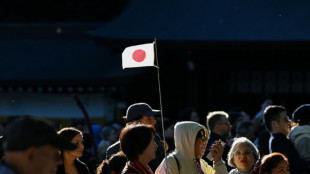 China tells citizens to avoid Japan travel as Taiwan row grows
China tells citizens to avoid Japan travel as Taiwan row grows
-
Purdue Pharma to be dissolved as US judge says to approve bankruptcy

-
 Iran's first woman orchestra conductor inspires
Iran's first woman orchestra conductor inspires
-
Wood gets all-clear in boost for England

-
 Golf's world No. 8 Thomas has back surgery
Golf's world No. 8 Thomas has back surgery
-
Rebooted Harlem museum celebrates rise of Black art

-
 'Desperation in the air': immigrant comics skewer Trump crackdown
'Desperation in the air': immigrant comics skewer Trump crackdown
-
UN regulator says shipping still wants to decarbonize -- despite US threats
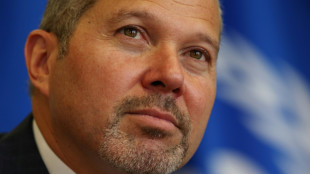
-
 Grant, Kim share halfway lead in LPGA Annika tournament
Grant, Kim share halfway lead in LPGA Annika tournament
-
Musk's Grokipedia leans on 'questionable' sources, study says

-
 Trump signs order to lower tariffs on beef, coffee, other goods
Trump signs order to lower tariffs on beef, coffee, other goods
-
Croatia qualify for 2026 World Cup, Netherlands close, Germany in limbo

-
 'Last Chance U' coach dies after shooting: US police
'Last Chance U' coach dies after shooting: US police
-
Sinner completes perfect ATP Finals group stage, Auger-Aliassime reaches last four

-
 Woltemade sends Germany past Luxembourg in World Cup qualifier
Woltemade sends Germany past Luxembourg in World Cup qualifier
-
Croatia qualify for 2026 World Cup with 3-1 win over Faroes

-
 Kai Trump makes strides but still misses cut in LPGA debut
Kai Trump makes strides but still misses cut in LPGA debut
-
Return to bad days of hyperinflation looms in Venezuela
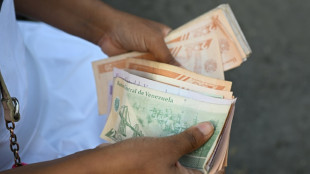
-
 US airspace recovers as budget shutdown ends
US airspace recovers as budget shutdown ends
-
Russia strike on Kyiv apartment block kills six, Ukraine says
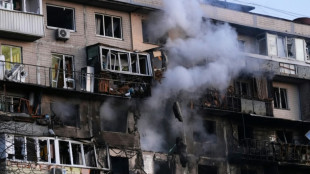
-
 Arrest made in shooting of 'Last Chance U' coach: US police
Arrest made in shooting of 'Last Chance U' coach: US police
-
At COP30, senator warns US 'deliberately losing' clean tech race with China
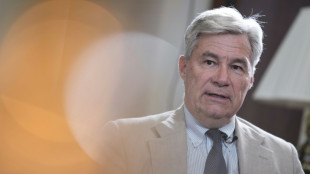
-
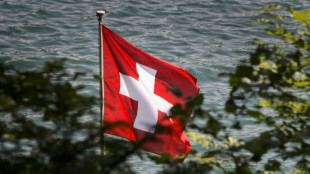 US, Switzerland say deal reached on trade and tariffs
US, Switzerland say deal reached on trade and tariffs
-
Fossil fuel lobbyists out in force at Amazon climate talks: NGOs

-
 Returning Alldritt blames himself for France axing
Returning Alldritt blames himself for France axing
-
Stocks struggle on US rates, tech rally fears

-
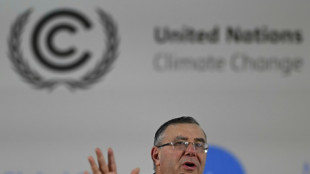 A rare oil CEO shows up at COP30, spars with activists
A rare oil CEO shows up at COP30, spars with activists
-
Trump demands probe into Epstein links to Bill Clinton
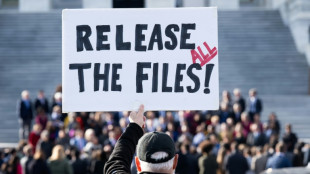
-
 England great Anderson says 'weak' Australia still Ashes favourites
England great Anderson says 'weak' Australia still Ashes favourites
-
Indigenous protesters disrupt UN climate summit again
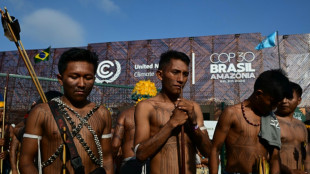
-
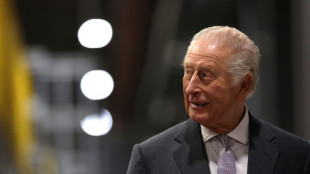 Gun salutes for King Charles III as he marks 77th birthday
Gun salutes for King Charles III as he marks 77th birthday
-
Ford urges England to make their own New Zealand history


Pakistan's trans people struggle to get safe surgery
In Pakistan, where gender affirmation surgery was recently legalised, Bunty is one of the few trans women who could afford to get it done safely.
Despite winning the right to medically transition in 2018, many transgender people in the Muslim-majority nation still turn to unqualified surgeons because of a lack of trained doctors, high costs and cultural taboos.
Bunty, who no longer uses her family name since her transition, said she went to the only doctor in the northeastern city of Lahore who performs breast augmentation surgery for trans women -- a qualified, experienced professional.
While the procedure was successful, she said it took place in an "underground" manner and cost twice the normal rate for a cisgender woman.
"I was kept at the hospital for only two hours and then I was forced to leave so that no one would find out," she told AFP.
"I was in extreme pain."
It was the latest ignominy for Bunty, who said she was shunned by her family over her gender identity, then sacked from the job that funded her hospital bills, pushing her into sex work.
She said the hospital did not want news of her procedure to spread among doctors and patients who might disapprove.
"Gender transitioning is still controversial. Doctors fear they will be judged," said Mudassir Mahboob, a doctor who carries out legal gender-affirmation surgeries.
Mahboob said he chose to work in the capital, Islamabad, to avoid causing controversy in his deeply conservative home province of Khyber Pakhtunkhwa.
He has operated on patients who have asked him to repair damage done to them by unscrupulous backstreet "doctors".
One of them, "who got castrated by a so-called practitioner, came to me and asked me to fix what went wrong", he said.
- 'Have fear of God' -
Reem Sharif, a member of a communal household known as a "dera" for trans people, said there were only two doctors in Pakistan openly offering legal, safe gender affirmation procedures.
Public hospitals often turn away those who enquire about such services, citing religion, Sharif said.
"They would say: 'Have fear of God, how can you try to do this?'" she told AFP, surrounded by other trans women putting on make-up and fixing their hair.
"Gender transition is legal according to the law, but practically it is not, and (it) is not accepted in society."
No reliable data exists on the number of transgender people in Pakistan.
The country has long recognised a third sex, known as "khawaja sira", who for centuries have played a spiritual role in society, offering blessings at weddings and births.
The 2018 law aimed to strengthen political and social rights for transgender people, whose wider integration was being met with increasing violence.
Despite being lauded around the world, the law drew domestic backlash from right-wing religious groups, which spread disinformation that it would lead to same-sex marriage in a country where homosexuality is illegal.
The law remains in force but is subject to court challenges, including a review of whether it complies with Islamic law, which coexists with Pakistan's secular legal code.
Psychiatrist Sana Yasir said "the most visits and follow-ups I have had" came in the three years since those challenges began, as transgender clients grappled with the potential repercussions of any legal change.
Rights groups say trans people who are helped to transition report better quality of life, while those not given support are more likely to report mental health issues, including suicidal ideation.
According to Pakistan's religious and cultural norms, having surgery to change gender characteristics is "a sin", even if it aligns one's body and gender identity, said Mehleb Sheikh, an independent trans rights researcher and activist.
Gender affirmation surgery is available in some other Muslim countries, such as Egypt, where the procedure is legal but only with approval from doctors and religious officials. In practice, access remains extremely limited.
In Iran, gender affirmation care is legal and even subsidised by the government, but according to activists, transgender people face discrimination on a daily basis.
- Threats, violence, and pride -
Activists say Pakistan is seeing a rise in violence against trans people, although exact figures are not available due to severe underreporting.
The Gender Interactive Alliance in Pakistan says 56 people have been killed since 2022.
They include three trans women whose bullet-ridden bodies were found on a roadside in the megacity of Karachi last month.
"My brother threatened to kill me and demanded that either I be thrown out of the house, or he would hurt me, blaming me for ruining their honour and their reputation," said Zarun Ishaque, a 29-year-old transgender man in Islamabad.
Despite the hardship, he told AFP that "this happiness after my transition is the dearest (thing)".
"My inner self has come out, and I am very happy with my life like this."
Haroon -- a pseudonym to protect his identity -- said his transformation had allowed him to finally feel "very comfortable with myself".
He has managed to have breast removal and bottom surgery despite being shunned by family and some doctors.
"If you have the capability, if you've taken this step and made the decision, then you don't step back," he told AFP.
O.Mousa--SF-PST
